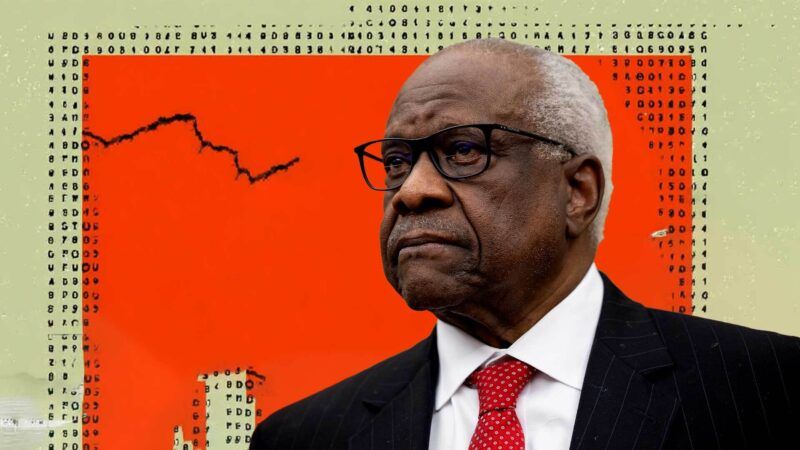Clarence Thomas Undermines Free Speech in Porn Site Age-Verification Case
The Supreme Court's decision in Free Speech Coalition v. Paxton weakens the First Amendment rights of adults everywhere.

Justice Clarence Thomas has a mixed record when it comes to freedom of speech. Sometimes, Thomas will write an opinion that leaves First Amendment advocates cheering. But other times, he will write one that leaves the same advocates scowling. Friday was a scowling sort of day.
Writing for a 6–3 Supreme Court majority in Free Speech Coalition v. Paxton on Friday, Thomas held that a state law which, by his own admission, "burdens" the free speech rights of adults, deserves less than the highest available level of judicial scrutiny because the law was passed in the name of protecting children. The upshot of Thomas' opinion is that the First Amendment rights of adults have been watered down.
You’re reading Injustice System from Damon Root and Reason. Get more of Damon’s commentary on constitutional law and American history.
The case centered on a Texas law requiring websites that contain "pornographic material" to verify that the site's users are at least 18 years old. The Free Speech Coalition, an adult industry trade group, argued that the state's intrusive age-verification scheme inevitably interfered with the rights of adult visitors to such sites. The law "imposes a clear burden," the Free Speech Coalition told the Supreme Court, "forcing adult users to incur severe privacy and security risks—which the statute leaves largely unaddressed—before they can access constitutionally protected speech."
Thomas more or less acknowledged that the Free Speech Coalition had a point, but then said that it did not really matter for his purposes because the state law was entitled to a more deferential standard of review by the courts. "Adults have the right to access speech that is obscene only to minors," Thomas granted. "And, submitting to age verification is a burden on the exercise of that right. But, adults have no First Amendment right to avoid age verification, and the statute can readily be understood as an effort to restrict minors' access." Thus, Thomas argued, "any burden experienced by adults is therefore only incidental to the statute's regulation of activity that is not protected by the First Amendment. That fact makes intermediate scrutiny the appropriate standard under our precedents."
Typically, laws that conceivably burden the First Amendment are subjected to strict scrutiny by the courts, which is the most exacting level of judicial review. Under strict scrutiny, the government must, first, prove that its law serves a compelling government interest, and, second, prove that the law is the least restrictive means available of advancing that interest. But Thomas opted instead for the less exacting level known as intermediate scrutiny. And, in so doing, he helped to ensure that the Texas law would survive judicial review.
In a statement, the Foundation for Individual Rights and Expression (FIRE) faulted Thomas' opinion for "effectively revers[ing] decades of Supreme Court precedent that protects the free speech rights of adults to access information without jumping over government age-verification hurdles." As FIRE ominously put it, "Americans will live to regret the day we let the government condition access to protected speech on proof of our identity."
